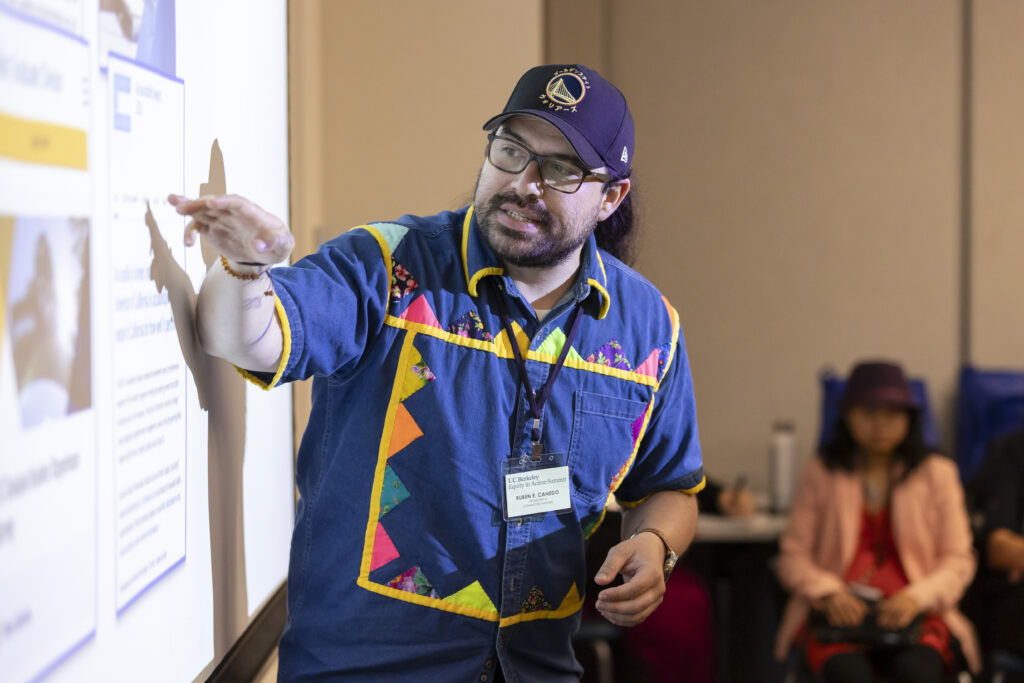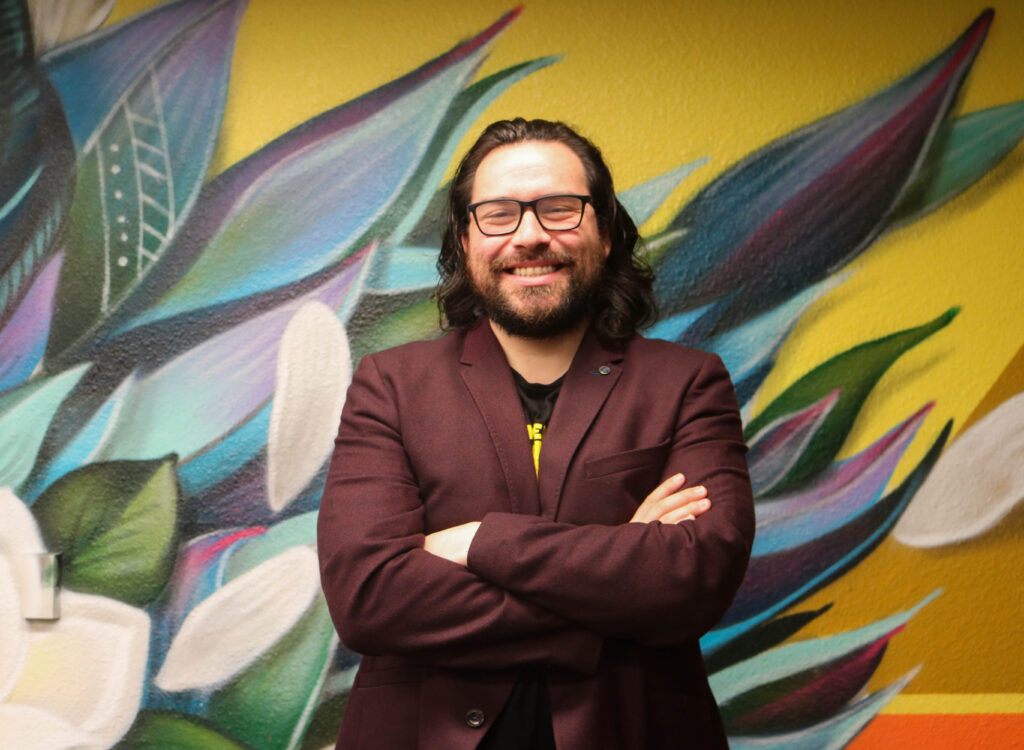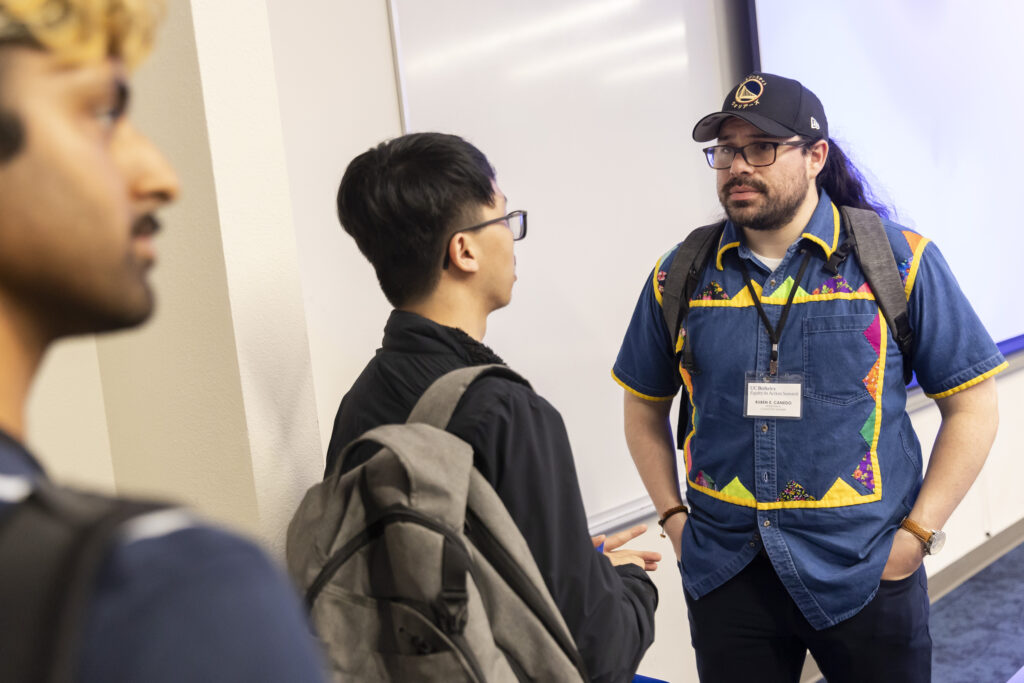A trailblazer for educational justice, Ruben Canedo leads with vision, charisma and community-building
As UC Berkeley's director of strategic equity initiatives, he's striving to make sure college students have the food, housing and other essentials they need to succeed in school and life.
August 4, 2025

Brittany Hosea-Small for UC Berkeley
A rainbow in the clouds. A visionary. A hustler, in the best sense. The Forrest Gump of Berkeley. A force of nature.
None of these is Ruben E. Canedo’s job title. But that’s how UC Berkeley’s director of strategic equity initiatives is described by those who know this charismatic scholar-activist best.
Even the uninitiated are drawn to the joyful dynamo — a 4th degree black belt in karate with a hearty laugh, waist-long hair and brilliant ideas.
Canedo’s focus and passion is educational justice for students with basic needs insecurity at Berkeley, in California and beyond. Recent data from the California Student Aid Commission show that 66% of postsecondary students in this high-cost state are food insecure, and 53% lack secure housing.
While still an undergraduate at Berkeley, Canedo helped conceptualize the campus’s Undocumented Student Program, which opened in 2012. In 2014, he launched Berkeley’s food pantry, then spearheaded the Basic Needs Center. Launched in 2019, the center served more than 7,000 unique students and had nearly 27,000 total contacts in 2023-24.

Basic Needs Center
“Ruben’s vision of a just world, where students have everything they need to grasp education and life opportunities, inspires me,” said Fabrizio Mejia, Berkeley’s interim vice chancellor for the Division of Equity and Inclusion, where Canedo works. “He’s been at the ground floor of helping launch many of the programs Berkeley is known for nationally.”
Canedo also co-led the creation of the UC system’s Basic Needs Initiative. Today, each of the 10 UC campuses has a basic needs center, made possible by recurring state funding, that includes a food pantry, emergency housing assistance and application support for CalFresh, the government’s food assistance program.
Those who have worked closely with Canedo say that vision, a knack for data analysis and storytelling, and the ability to connect with and influence others are his superpowers.
“He finds the resources he needs to make and sustain change, and he makes sure to bring everyone who needs to go with him along for the journey,” said Kyle Southern, executive director of the Chicago-based Partnership for College Completion, who has known and worked with Canedo since 2013. “He is — and I mean this in the best way — a hustler.”
Colleen Ganley, a program specialist in the California Community Colleges (CCC) chancellor’s office, called Canedo “a centrifugal force of nature, … a planet with gravitational pull, that … starts bringing in partners and thought friends and energies that are compatible and says, ‘We’re going to do this together, and we’re going to create something that changes lives where there had been nothing.’”
Ganley is part of the California Higher Education Basic Needs Alliance (CHEBNA), which Canedo organized in 2016 so that leaders from the UC, California State University (CSU) and CCC systems could address basic needs insecurity together and advocate for change.

Gretchen Kell/UC Berkeley
In the past several years, such change has included basic needs being codified — explicitly recognized and defined as legal rights — in state higher education by the California Legislature, and the state’s provision of $19.5 million in ongoing funding for students’ basic needs and rapid rehousing.
And multiple studies and reports on college students’ basic needs at research universities, the result of efforts by Canedo and his collaborators, have informed both national and state policies.
Back in 2012, “nobody was talking about basic needs,” said Canedo. “Now, in higher education, basic needs is part of the conversation, the national conversation. We have changed the entire landscape across the country.”
Despite his accomplishments, Canedo is perpetually humble — that’s why Mejia calls him “the Forrest Gump of Berkeley” — and uses “we” and “the incredible community that we are” to explain how that dial got moved.
“That’s his personality, to want to give credit,” said Kiyoko Thomas, director of Berkeley’s Basic Needs Center. “But somebody has to lead the effort, somebody has to do the initial organization and create the scaffolding for something to happen. He does deserve a lot of credit.”

Brittany Hosea-Small for UC Berkeley
It’s also his personality to brighten every room.
“Sometimes I wonder, ‘What planet did you come from?’” added Thomas. “I don’t think I’ve ever met anyone like him. Ruben’s always thinking about joy and levity, but it’s because he really cares about how we’re doing the work, and this is the hardest work.”
Lights for his way
Canedo learned early about trauma and injustice. He also discovered the transformative power of family and community.
“These people were lights for my way,” he said.
His mother, who is indigenous to Mexico, and his father, the son of a bracero and born in Mexico but raised in the U.S., met in college in Mexico City. His father left law school to become a full-time martial artist and captain of Mexico’s national karate team. His mother earned a degree in psychology, then worked in early child development and led couples therapy.
After Canedo was born in 1989 in Indio, California, the family moved to Mexico City, a center for karate and other international sports. But by 1992, the U.N. had labeled it the world’s most polluted city. “My lungs were not able to function well enough there,” said Canedo, who from birth has had allergies and asthma.

Kirpa Singh/UC Berkeley
So they moved to Mexicali, a Northern Mexico border town close to U.S. medical help, living there until Canedo finished 4th grade.
After that, to fulfill his father’s dream that he attend middle and high school in the U.S., Canedo moved with his mother to Calexico, on the U.S. side of the border. As part of a public health grant that his school district had, he was taught how to handle his asthma attacks.
“It was a disability justice experience for me,” he said. “I didn’t feel a sense of guilt and shame for my disability, but embraced, taught and supported.”
After school each day, Canedo returned to Mexicali to help his dad teach karate, as he was a young martial artist competing at an elite level. “It was very, very rigorous work, both mental and physical,” said Canedo, “but from my father I learned to have a Zen approach to challenging, chaotic times and to normalizing defeat.”
As high school graduation neared, heading to college was rare for young people in his rural, agricultural town. Although Canedo took part in programs like MESA and AVID, for bright, disadvantaged students, “I didn’t know what UC Berkeley was,” he said.
He imagined applying to schools “where my lungs were going to survive,” he said, like the UC campuses near Southern California beaches. But when an AVID teacher noticed he wasn’t applying to Berkeley, “she smacked me on the back of my head and said, ‘What are you doing?’” said Canedo. “I give her all the credit.”

Kirpa Singh/UC Berkeley
Canedo was admitted to Berkeley, but soured on attending after “a horrible interview, a racist experience,” he said, as a candidate for the Regents’ and Chancellor’s Scholarship. Luckily, Cruz Grimaldo, then-assistant director of financial aid, intervened. Canedo was given the award and enrolled in 2007. And Grimaldo, who today is associate vice chancellor of financial aid and scholarships and Cal Student Central, remained his advocate.
Even with the scholarship, at one point during college Canedo held four jobs simultaneously — as a tutor, at a cellphone store, doing safety and clean-up at weekend community events and as an Educational Opportunity Program (EOP) academic peer counselor, a job Mejia recommended to him.
“I was supporting family all year round,” said Canedo. “I was taking care of stuff I needed and supporting my family, so my parents would never have to worry about finances.”
Although his mom once had a career with a good income in Mexico, the family’s finances were being drained in the U.S. to help her get citizenship. “Her immigration process was very broken, there was a lot of corruption,” said Canedo, adding that the matter took decades to resolve.
“You don’t realize how poor you are, how much poverty you’re in, and how challenged your experience is until you leave home,” said Canedo. “It blew my mind,” he added, when a Berkeley classmate he was paired with for an assignment said he’d attended a top-scoring private high school where each freshman had a college trajectory tutor.
“This was part of my transition to Berkeley, this magical world I’d never heard of,” he said. “We didn’t all have the same trajectory, yet we were all expected to learn, perform, complete and graduate, despite the wide spectrum of privileges and resources we had come from.”

“A Beautiful Mind”? There’s something about Ruben’s mind that’s really beautiful. He’s able to see the future and see the possibility there … and he knows how to make that happen.”
Brittany Hosea-Small for UC Berkeley
It’s no time to rest
At Berkeley, Canedo majored in both ethnic studies and social welfare. But he also “became obsessed with higher education,” he said. “I couldn’t stop reading about it and going to professors’ office hours and having conversations about it.
“I couldn’t believe it could have such a powerful effect on communities and bring such lifelong economic outcomes. And, I thought, if we know that’s true, why isn’t there the culture, the infrastructure, so that everyone in California can have access to it?”
He resolved to make a difference. After graduating in 2012, Canedo spent a year at the Palo Alto-based Emerson Collective, a social impact organization that focuses on issues including education, immigration reform, the environment and social justice.
A year later, he was back at Berkeley as a research and mobilization coordinator for the campus’s new Centers for Educational Equity and Excellence (CE3), an umbrella that was forming to support systemically marginalized students, such as former foster youth, student parents, student veterans and undocumented students.

Brittany Hosea-Small for UC Berkeley
When Canedo helped in 2013 with the UC Undergraduate Experience Survey (UCUES), he first learned how many Berkeley students were hungry. “They had such headaches and their energy was off, they were so malnourished,” said Canedo. “Some said they were behind on paying the rent.
“To this day, that needs assessment was one of the most emotional ones I’ve conducted. The last thing you need to be is hungry, struggling for rent and going to college. College is already difficult.”
Much progress has been made since, but Canedo said this is no time to rest. He’s even in an additional role at the Center for Economic Justice and Action, which he co-founded, training a UC-wide corps, statewide leaders and national partners to advance and improve students’ access to food, housing, health care, technology and other essential needs.
According to the UC’s 2025 Basic Needs Annual Report, food insecurity for undergraduates increased 5% between 2022 and 2024 — from 43% to 48% — as pandemic era emergency aid programs and expanded CalFresh eligibility ended. For graduate students, it climbed from 21% to 35%.
The report added that rent in California is up more than 35% since 2020, while wages grew only 22%, and utilities have risen 45%, gas 28% and household food expenses 27%.

Ruben Canedo/UC Berkeley
The UC report urged higher education, philanthropic and research organizations, plus state and national leaders, to work toward “a common vision” of supporting students’ basic needs. Meanwhile, the federal government continues actions to cut public benefits across health care, housing and the Supplemental Food Assistance Program (SNAP, or CalFresh in California). In 2023-24, 3,146 Berkeley students submitted CalFresh applications, with support from the Basic Needs Center.
Undaunted, Canedo continues alliance-building. A recent success, he said, was the restoration to California’s 2025-26 budget of what would have been a nearly 90% proposed cut to the CalFood program. CalFood’s state funding allows food banks to buy more food than they might otherwise be able to afford, supports local farmers and producers, and complements CalFresh.
“We brought everybody together and created a one-pager to help state leaders understand why the CalFood budget isn’t just a food budget, but a college completion budget,” said Canedo. “You can’t operate 116 CCC, 23 CSU and 10 UC food pantries — with over 145,000 being served —without that. This was a massive victory.”
So much progress has been made to prioritize students’ basic needs, and with the state’s recognition that college graduates are valuable to the California economy, he added, “we can’t start losing them.”